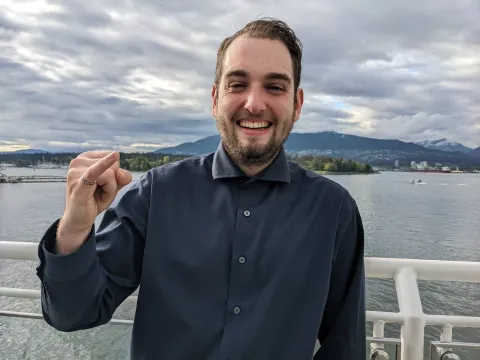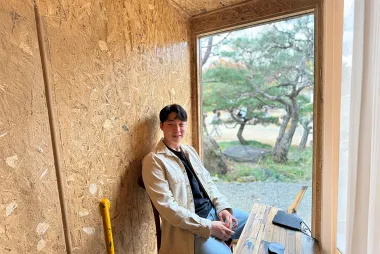"Say yes and try as many things as you can at university, you never know what you might like!"

Mark Greenwood
- Degree: Bachelor of Applied Science
- Grad year: 2022
- Program:
- Campus: Vancouver
IGEN students choose electives, forming a major and a minor in two engineering disciplines; I chose Mechanical and Computer Engineering, respectively. Through my degree, I was fortunate to have broad work, design team, and volunteer experiences!
During my time at UBC I was involved with UBCRocket’s engine propulsion team and served on student government as Integrated Engineering’s shop manager and co-president. I was also IGEN’s 3D printing manager, an undergraduate research assistant at UBC’s Pulp and Paper Center, an engineering support services coordinator at Ledcor, and an estimator/project coordinator at Regehr Contracting. I will be returning to Regehr as an estimator/project manager later this year.
Outside of academics, I enjoy living in North Vancouver where I hike, swim and ski on the weekend (depending on the season). Year-round I like wood turning, working on cars, 4x4ing, and experiencing local breweries.
Why did you choose to go into your field of study at UBC?
I hadn’t heard of Integrated Engineering until the former program head, Daan Maijer, gave a presentation to our first-year engineering transfer program cohort at Capilano University. Daan talked about the open-endedness of the yearly capstone projects (one of the defining features of IGEN), which piqued my interest. The flexibility of the degree was also appealing—beyond the capstone courses, we are allowed to pick interesting courses to hyper-specialize in certain areas. I chose IGEN for these reasons and was not disappointed. IGEN’s community is both close-knit and diverse, with people bringing a range of perspectives and interests. And through an active student government, it only seems to be getting better!
What has made your time at UBC memorable?
For me, the most memorable part of UBC was the people. Whether it’s on a design team or in the IGEN clubroom, the engineering community consistently impresses and surprises me—and not just in the classroom. Going to the IGEN clubroom was often a surefire way to ensure that none of my homework got done that day. Whether shooting the breeze or helping someone with their project, I struggle to think of a better way to have spent countless hours of my degree. Meeting new people or bumping into someone and then losing track of hours was always a highlight of my day.
Tell us about your experience in your program. What have you learned that is most valuable?
Maybe the most valuable skills I learned were from my design team experiences. I was on UBCRocket’s payloads team for one year before moving to the propulsion team for two. Through Rocket, I discovered how much I love manufacturing and making things with my hands (an experience rarely offered in class). Teammates were always happy to answer questions about milling, turning, or anything in between. I spent many late nights in the machine shop trying to figure out problems and make things work. These skills—and the attitude that goes with them—served me well as IGEN shop manager, where I ran shop training, helped others learn how to make things, and (I hope) ignited a passion in them to create. Through Rocket and the IGEN shop, I developed a blend of confidence and humility. A good engineer must immerse themselves in the right knowledge and surround themselves with the right people, but they must also know when to ask for help. I have been humbled, many times over, by the knowledge my friends possess. When people are looking to you for answers it can be hard to say “I don’t know,” but I now know the value of building a network of people whom I can reach out to, to “know.”
What advice would you give a student entering your degree program?
In the earlier years of my degree I wish I had said “yes” and taken risks more often, rather than fretting about classes. You can almost always spend more time on schoolwork, but after a course is over there are often few opportunities to go further with them. Meeting peers, attending networking events, and generally just putting yourself out there (even if it makes you a tad uncomfortable) is an underappreciated aspect of university. Many of your peers will go on to amazing things, so take the time to get to know them socially, not just academically. The friendships you build now can—and will, if you foster them—last for the rest of your life.
How did your studies in the Faculty of Applied Science prepare you for the future of work?
Regardless of what jobs appear in the workforce over the next decade, there will be one constant: people. Every job will have some aspect of working with others to accomplish a goal. Whether it’s engineers collaborating to complete a multi-disciplinary project or technical and non-technical team members interfacing with one another, people are necessary. The Faculty of Applied Science and my Integrated Engineering degree exposed me to an incredibly diverse group of people, each with their own expertise and experiences. The benefit from this is twofold, as it gives practice in communicating technical information to non-technical individuals and also demonstrates the creative value in a diverse team. Getting exposure to this early was a key component in presentations for my capstone courses. In addition, my degree showed the value in having a diverse team, thus leading to more out of the box ideas and perspectives that one might not consider otherwise.



